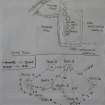Pricing Change
New pricing for orders of material from this site will come into place shortly. Charges for supply of digital images, digitisation on demand, prints and licensing will be altered.
Upcoming Maintenance
Please be advised that this website will undergo scheduled maintenance on the following dates:
Thursday, 9 January: 11:00 AM - 3:00 PM
Thursday, 23 January: 11:00 AM - 3:00 PM
Thursday, 30 January: 11:00 AM - 3:00 PM
During these times, some functionality such as image purchasing may be temporarily unavailable. We apologise for any inconvenience this may cause.
Tormain Hill 6
Cup Marked Rock (Neolithic) - (Bronze Age)
Site Name Tormain Hill 6
Classification Cup Marked Rock (Neolithic) - (Bronze Age)
Canmore ID 368670
Site Number NT16NW 123
NGR NT 12908 69669
Datum OSGB36 - NGR
Permalink http://canmore.org.uk/site/368670
- Council Edinburgh, City Of
- Parish Ratho
- Former Region Lothian
- Former District City Of Edinburgh
- Former County Midlothian
Note (3 February 2019)
Date Fieldwork Started: 03/02/2019
Compiled by: ELF
Location Notes: Located on top of Tormain Hill (approx 500m above sea level) 500m along a public access pathway running parallel to Wilkieston Road (between Ratho Mains and Bonnington Mains). Arable and pastural landscape surrounds the location, with good 360 degree views interrupted only by mature woodland. Arthur's Seat and Blackford Hill are visible to the E, Pentland Hills to the S with views of the Ochill Hills and the River Forth to the N. Tormain 6 is one of 8 panels that are included under the same Canmore ID 50365 and is located at the centre of the grouping. In relation to Tormain 6, Tormain 5 lies 2.1 m to the E, Tormain 3 lies 1.5 m to the NW, and Tormain 7 lies 0.1 m to the SSW.
Panel Notes: A small (0.6m x 0.45m) panel with a single cupmark situated to the N edge of the panel. A shallow fissure runs to the E of the cupmark on a NNE-SSW orientation. The S edge of the panel is exposed, with the W, N and E edges lying flush with the current land surface. The surface area of the panel is now markedly smaller than that recorded on Canmore. There are two major areas of moss on the panel.






















